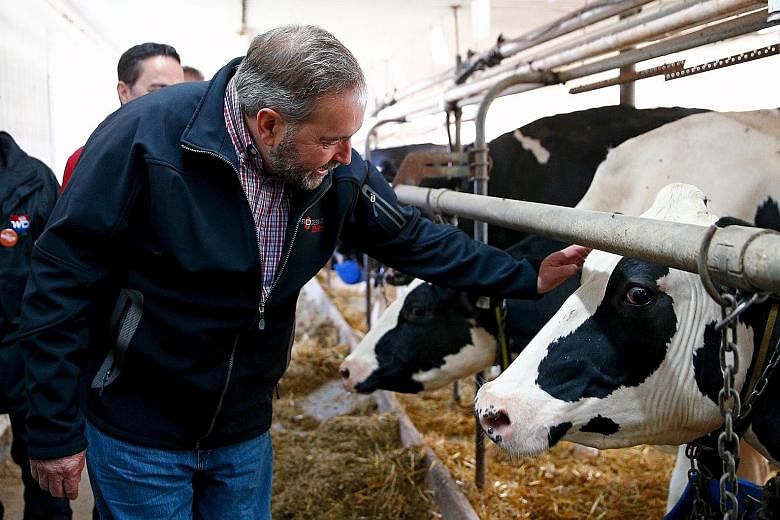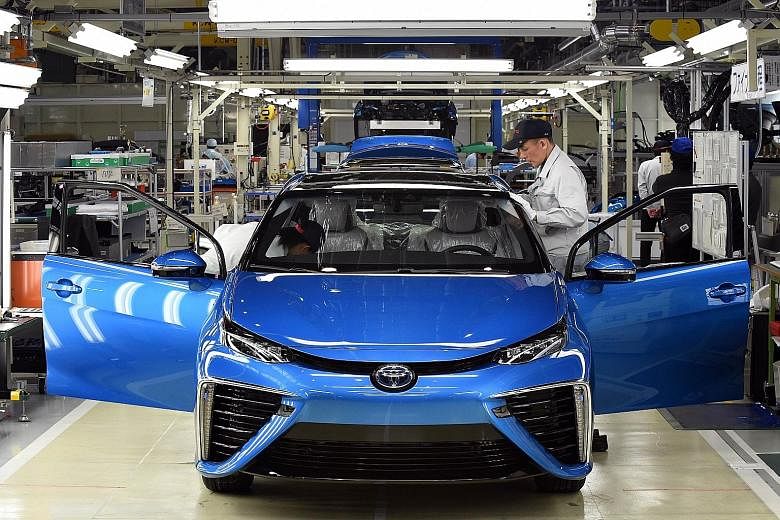A far-reaching trade deal covering 40 per cent of the world economy was finally struck yesterday after five years of intense negotiations and several controversies.
The final discussions began in Atlanta last Wednesday and went on round the clock until the breakthrough yesterday, ending a marathon process that began in March 2010 and included 32 rounds of negotiations.
A planned announcement of the the Trans-Pacific Partnership (TPP), as the agreement is called, was delayed repeatedly on Sunday as talks on a few final sticking points dragged on.
These included a stand-off between Japan and the United States, Canada and Mexico over the "rules of origin" covering cars and car parts, or what percentage of them should be made in TPP countries to qualify for its benefits.
There was also a stand-off over the issue of how much Canada, Japan and other countries should open up their protected dairy markets and how long pharmaceutical companies should enjoy monopoly periods for next-generation "biologics" drugs.
-
Highlights of the deal
-
The agreement reached on the Trans-Pacific Partnership (TPP) trade pact yesterday included the following highlights:
• The agreement will provide duty-free trade on most goods, and reduced tariffs on others. For the United States alone, the trade pact would eliminate more than 18,000 taxes on US products.
• The period of exclusivity afforded to new biologic drugs will be at least five years, according to US Trade Representative Michael Froman, as demanded by Australia and New Zealand, but lower than the 12-year period sought by US pharmaceutical companies. In addition, the pact provides some time for "other measures" to safeguard biologic drugs from generic variants.
• The partners to the deal will sign a pledge not to devalue their currencies to make their exports cheaper in tandem with the regional trade deal.
• Under the deal, in order for vehicle exports to be eligible for the beneficial tariff rates under the TPP, 45 per cent of content of the automobile must comprise items that were sourced from countries that are party to the trade pact.
• The extent of market access to sensitive sectors has been capped by some countries. For example, Canada says that only 3.25 per cent of its sensitive dairy sector and around 2 per cent of the poultry market would be opened up to TPP participants over five years.
• Under the deal, parties would be subject to enforceable labour and environmental standards.
• If ratified, it would be the largest pact governing global commerce in more than two decades, encompassing 40 per cent of the world's economic output.
• Under the fast-track legislation US President Barack Obama signed in June, Congress will have at least 90 days to review the deal. That means up-or-down votes will not take place until next year, just as the first primary election votes loom.
REUTERS
The deal must now be signed formally by the leaders of the 12 nations - Australia, Brunei, Canada, Chile, Japan, Malaysia, Mexico, New Zealand, Peru, Singapore, the US and Vietnam - and ratified by their parliaments.
The TPP countries represent a large market for Singapore, accounting for 30 per cent of its total trade in goods in 2013 and 30 per cent of foreign direct investment here.
The deal is expected to boost trade and investment links between Singapore and key markets in the region and elsewhere in the world, including in fast-growing Latin America.
Singapore does not have free trade agreements with Canada and Mexico, which means the TPP will open these new markets for companies based here.
The TPP has its roots in the Trans-Pacific Strategic Economic Partnership, which came into effect in May 2006 between Singapore, Brunei, Chile and New Zealand. Two years later, the US, Australia and Peru formally indicated their interest in negotiating a free-trade agreement with these four nations. This agreement became known as the TPP.
Malaysia and Vietnam formally joined the talks in 2010, followed by Mexico and Canada in 2012, and Japan in 2013.
Other countries are lined up to potentially accede to the deal, including Asian economies such as South Korea and the Philippines, and Latin American ones like Colombia.
The TPP has been said to represent US President Barack Obama's strategic "pivot" towards Asia, and a response to the rise of chief rival China's growing regional and global influence.
However, the US President still faces a steep challenge in the months ahead to win approval for the deal in a deeply divided Congress.
A range of criticisms have been levied against the TPP - for instance, some have lambasted the deal for being negotiated in secret and being biased towards corporations.
It also contains a controversial mechanism that will allow investors to bring TPP governments to arbitration. Critics fear this will undermine the ability of governments to regulate multinational firms.


